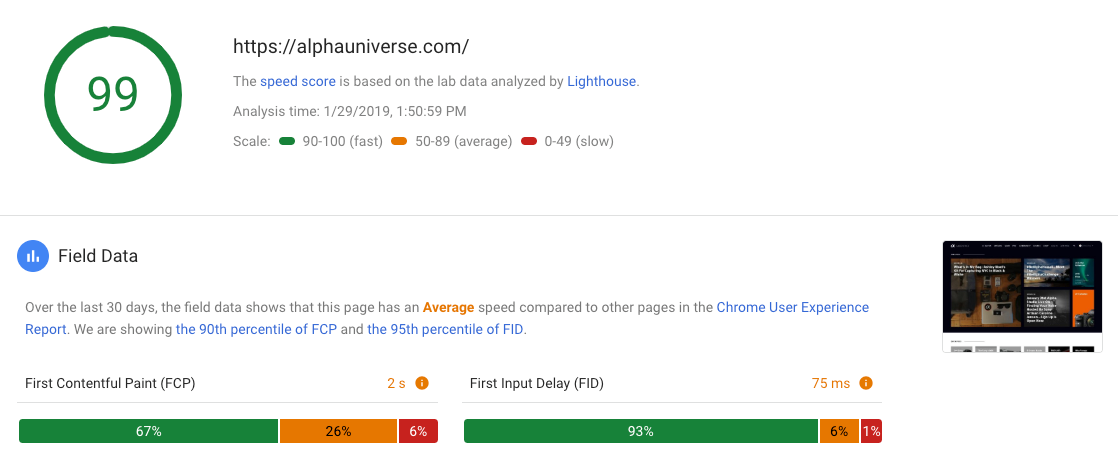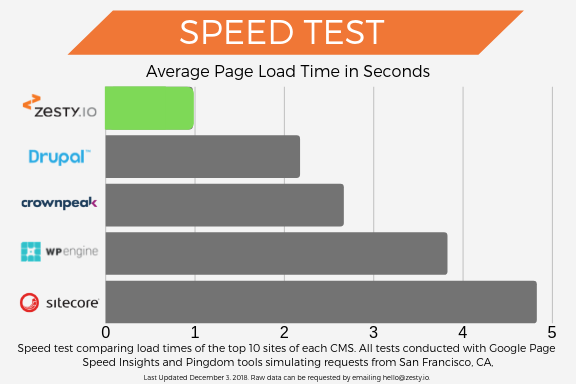Dominate Google in 2019: Site Speed + Long Form Content
The fundamentals of SEO rarely change. But there’s no question Google is heavily in favor of two things in 2019. Sites that load quickly, and long form content.
Said another way, the best one-two punch for ranking your website highly in Google these days is a fast website that is jam-packed with 3,000 word pages.
Before we dig into some solutions and tactics, here’s a simple recipe for you to consider to “check these boxes” for Google this year.
Use Zesty.io as your lightning-fast CMS.
Use MarketMuse to plan your content and leapfrog your competition.
For proof of on how effective these two platforms can be, look no further than our own growth in organic search traffic over 2018.

Zesty.io Site Traffic 2018
This website is hosted on Zesty.io, and a majority of our content is planned using MarketMuse.
Why This Matters
Consider what Google’s search engine does. It’s primary goal is to connect a user that has entered in a keyword search to the most relevant answer or solution, in as short as time as possible.
We searchers use and trust Google because for two decades now, they’ve done the best job of getting us answers and getting them fast.
If you’re a marketer or website owner, this isn’t news. Google is the only search engine worth caring about and your website’s success can live or die by its graces.
Marketers tend to agree that what Google cares about, they care about, too.
So let’s look at site speed and long-form content in more detail, to ensure you’re maximizing each of these signals in your own efforts to drive traffic from the “big G”.
Site Speed
Google has emphasized site speed as users have fled to mobile. Over 50% of all searches are now done on mobile. And fast pages that quickly load lead to happy users, no matter what device they’re using.
Google tracks this by observing page load times and bounce rates. Your site speed can be affected by a number of factors. This includes your web host, your content management system, how your site is coded (including Javascript calls, image size and rendering, and more), and the number of third-party “calls” your site makes to things like ad platforms and APIs.
Before taking any action, you’ll need to diagnose how your site speed is currently performing. You can test your own site speed using free tools like Pingdom, as well as inside Google Analytics and Google Search Console.
How does your site stack up?
With an average site load time of under one second, we know a thing or two about site speed here at Zesty.io.
What Makes a CMS Fast
There’s a lot of configuration under the hood of what makes a CMS fast. From the CDN to how content is served from the CMS, there are a lot of factors. Zesty.io partners with best of breed technologies such as Fastly and Google Cloud platform (yep - Google itself!) to ensure users sites are as fast as possible with the technology they provide under the hood. Otherwise, there’s lots of ways to mix-and-match how content is delivered from a CMS; but, sub-par servers or CDNs sacrifice speed.
Take one of their heaviest websites, for example: Sony’s Alpha Universe. Alpha Universe is filled with tons of great content for photographers and thousands of high-resolution photos. With their SaaS platform, Sony’s site loads in seconds.

And, we decided to see if that was users’ experiences across the board. We compared the top CMS’s 10 best websites to 10 random Zesty.io sites, and the results speak for themselves:
 So, having the infrastructure to serve an amazing site is just as important to Google the next step.
So, having the infrastructure to serve an amazing site is just as important to Google the next step.
Long-Form Content
We’ve stated Google’s primary goal is to deliver users a solution to their search query. The reason their algorithms have come to prioritize and reward longer content is simple.
Longer content typically does a better job of addressing a topic or query in full.
Said another way, a 3,000 word page outlining all the “who, what, where, when, why and how” of a particular product, service, or topic is more useful to users than 300 words on the same topic.
Google rewards websites that take the time to more thoroughly research and write their content in this way. It’s 2019. Gone are the days when marketers could effectively keyword-stuff a short page of content and find success in the Google rankings.
And it makes sense, doesn’t it?
If you click on a result from Google and the page loads fast and then you are presented with a full “ultimate guide”-style answer to whatever you searched, you’re happy. You are more likely to stay on the page longer (time on site, another ranking factor), and less likely to quickly leave and go to another result (bounce rate).
Site owners and marketers who can produce the topical knowledge to write longer, comprehensive content benefit by seeing higher search rankings. It’s also “not easy to fake” nor is it cheap to be able to produce that type of content. That’s all good in the eyes of Google, because rewarding the long-form content publishers who have real a real business model or a real expertise pushes lower quality content further down the search results. Thus improving the overall Google results, in an ongoing cycle.
Chances are, you agree that long-form content matters, and having it can help increase your search traffic. But how can actually set out and write long-form content that Google loves?
Enter MarketMuse.
We’re big fans of MarketMuse’s ever-improving tool for keyword research and content planning. MarketMuse is effectively powered by algorithms meant to mimic Google’s own. The tool uses latent semantic analysis to comb through keyword topics and output data and suggestions that map out content for any given topic.
For example, if one of your target keywords is “headless CMS”, you enter that keyword into the tool and use the resulting data from MarketMuse to plan a long-form article on the topic, with suggestions on how long it should be, what subtopics to address, and what questions to be sure to answer so the content is comprehensive.
You can then take that data to your editorial team or whoever writes the content (even if it’s you!) and get to work.
We run this process for Zesty.io. The result is something like this, our page on “What is a Headless CMS?” here.
And the power of this tool and type of planning is not limited to generic product or service keywords.
If you sell sterling silver jewelry or stylish men’s watches, you should be planning long-form content that addresses all the surrounding consumer questions about materials, shipping, service, and more. Your product pages should include keyword mentions and FAQs that fit your target market’s interests and desires.
You can see Google rewarding long-form content in just about every niche imaginable, from online marketing strategies to medical benefits questions to DNA test results. In the game today, it’s a whole lot more than just writing a simple little page and hoping to complete.
Between the speed of our platform and our own investment in content of this type, the results speak for themselves.
Contact Zesty.ioIf you’re ready to up your game for site speed, click the button above to learn more about Zesty.io. For an introduction to MarketMuse, contact them directly.
By Nate Broughton
Nate Broughton is an internet marketing veteran of 17 years who specializes in lead generation and client acquisition. He’s built and sold four companies and been involved in several acquisitions with private equity firms. He’s now the leader of a movement and company called The Opt Out Life which teaches people all over the world how to design an amazing lifestyle centered around fun and experiences… While still making fantastic money in an industry they love.